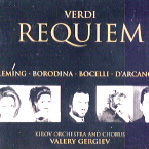Verdi’s Requiem as a party record? Yes, if it’s saddled with the vocally challenged Andrea Bocelli. Lots of laughs here from the tenor: listen to his Quid sum miser, for one of many side-splitters. His pop singer’s voice is unsupported, his singing blissfully innocent of Verdian phrasing, his trill, a pathetic shake. The choppy Ingemisco is quavery, his successful efforts to undermine ensembles obviously aided by the microphone. He’s probably laughing too, all the way to the bank. Bocelli is a media and marketing creation, so I figured that the cynics who inflicted him on this project would plaster his name and photo all over the cover and booklet. Instead, he gets equal billing and the cover art is tasteful. I guess some small measure of shame was operative. A very small measure though, since the booklet features pictures of the principals accompanied by quotes assuring readers of their fondness for Verdi and his music. Signor Bocelli, for example, assures us that the Requiem is “a mixture of despair and hope”. In my case, despair over his participation and hope for his immediate full-time return to the world of pop.
But enough of fraudulent tenors. What about the rest of the performance? Every recording of Verdi’s Requiem has some shortcoming, whether a miscast soloist, unidiomatic singing or playing, or engineering that fails to capture the score’s huge dynamic extremes. And there’s the problem of balancing the dramatic and the spiritual and molding both elements into a satisfying whole. Valery Gergiev and his team (though Bocelli is more properly on the marketing, rather than the artistic, team) fall short. Gergiev does rip into an ear-shattering “Dies Irae”, but his chorus can’t quite deliver the necessary dynamic and tonal shadings. Ditto for the orchestra, whose trumpets sound like feather-bedding after you’ve heard the Chicagoans under Solti. The devotional aspects of the score come off as simply slow because there’s a lack of the note-to-note tension that fits the huge stakes involved here–soloists and chorus are pleading for salvation, not for stock options. Part of the problem derives from Gergiev’s “objective” conducting that bars emotion-enhancing portamentos and rubatos. The Agnus Dei, for example, is done about as “straight” as I’ve ever heard it and this is the one recording in my recollection where the magical string entry under the soaring soprano in Sed signifer sounds casual.
Ideally, the singers of Verdi’s Requiem should be capable of singing the leads in Aida. Olga Borodina can be an effective Amneris, but Renée Fleming, though she may have the most beautiful soprano voice today, is no Aida. Her Libera me is quite good, her floating lines elsewhere are ravishing, her duet with Borodina in the Agnus Dei delicious. But too often she lapses into the self-regarding archness that often afflicts her phrasing these days, and I miss the vocal breadth and raw Italianate quality others bring to the part. I felt I’d rather hear her in Mozart, just as I’d rather hear bass Ildebrando D’Arcangelo as Figaro. He is an asset to the production but just misses the black resonance and depth to make the Confutatis and the Mors stupebit chilling. The engineering faithfully depicts the voices and sports wide dynamics, but ensembles are often muddy and the whole can get wearing when played at full throttle, necessary if you don’t want to miss low-level detail.
Take away the Bocelli factor and you get a decent professional performance; but unless you’re a fan of the artists, stick to Solti I, Reiner, Guilini, Barenboim, or Shaw among the stereo issues, and Toscanini, Serafin, and De Sabata among the vintage ones. They all have small faults and most have a miscast singer or two–but none of them, thank God, has Bocelli.
































